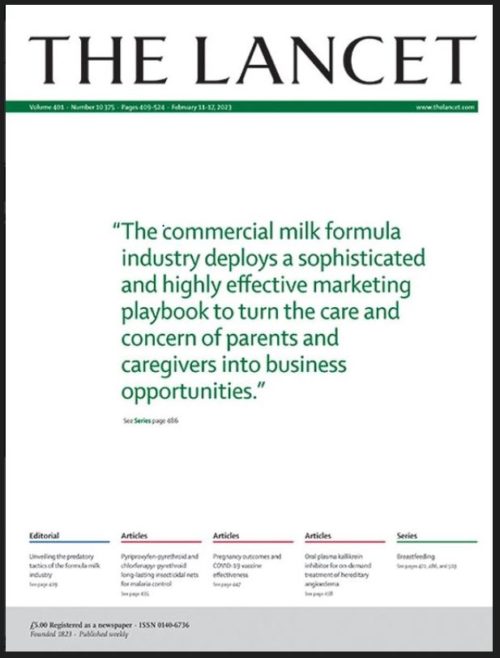I’m giving this lecture at UCSC, Sponsored by the Humanities Institute. Title: “Food Politics 2026: Sustainable Food in the Trump Era.” 6:00 p.m. Cowell Ranch Hay Barn, Ranch View Rd. Register here.
Weekend reading: Lancet Commission on Breastfeeding vs the Infant Formula Industry

The Lancet has just published its commissioned series on breastfeeding, vs the commercial formula industry: three papers, an editorial, and a comment.
Breastfeeding has proven health benefits for both mothers and babies in high-income and low-income settings alike. Yet, less than 50% of babies worldwide are breastfed according to WHO recommendations. For decades, the commercial milk formula industry has used underhand marketing strategies, designed to prey on parents’ fears and concerns, to turn the feeding of infants and young children into a multibillion-dollar business—generating revenues of about $55 billion each year.
Editorial: Unveiling the predatory tactics of the formula milk industry
For decades, the commercial milk formula (CMF) industry has used underhand marketing strategies, designed to prey on parents’ fears and concerns at a vulnerable time, to turn the feeding of young children into a multibillion-dollar business. The immense economic power accrued by CMF manufacturers is deployed politically to ensure the industry is under-regulated and services supporting breastfeeding are under-resourced.
Breastfeeding: crucially important, but increasingly challenged in a market-driven world. R Pérez-Escamilla,, et al.
In this Series paper, we examine how mother and baby attributes at the individual level interact with breastfeeding determinants at other levels, how these interactions drive breastfeeding outcomes, and what policies and interventions are necessary to achieve optimal breastfeeding.
Marketing of commercial milk formula: a system to capture parents, communities, science, and policy. N Rollins et al.
We report how CMF sales are driven by multifaceted, well resourced marketing strategies that portray CMF products, with little or no supporting evidence, as solutions to common infant health and developmental challenges in ways that systematically undermine breastfeeding. Digital platforms substantially extend the reach and influence of marketing while circumventing the International Code of Marketing of Breast-milk Substitutes.
The political economy of infant and young child feeding: confronting corporate power, overcoming structural barriers, and accelerating progress. P Baker, et al.
First, this paper highlights the power of the commercial milk formula (CMF) industry to commodify the feeding of infants and young children; influence policy at both national and international levels in ways that grow and sustain CMF markets; and externalise the social, environmental, and economic costs of CMF. Second, this paper examines how breastfeeding is undermined by economic policies and systems that ignore the value of care work by women, including breastfeeding, and by the inadequacy of maternity rights protection across the world, especially for poorer women. Third, this paper presents three reasons why health systems often do not provide adequate breastfeeding protection, promotion, and support.
Comment: Stemming commercial milk formula marketing: now is the time for radical transformation to build resilience for breastfeeding, by Tanya Doherty et al.
One of the striking messages of the Lancet Breastfeeding Series is that the consumption of commercial milk formula (CMF) by infants and young children has been normalised. More children are consuming CMF than ever before. Only 48% of the world’s infants and young children are breastfed as recommended, despite the huge body of evidence on the lifelong benefits of breastfeeding. This situation reflects the stranglehold the CMF industry has on governments, health professionals, academic institutions, and increasingly on caregivers and families through pervasive social media.
*******
For 30% off, go to www.ucpress.edu/9780520384156. Use code 21W2240 at checkout.


